
|
The Radeon HD 5850 is ATI's videocard of choice for the gamer on a budget. It takes over where last generation's price/performance darling, the Radeon HD 4850, left off. It's also happens to be in the highest echelon of AMD's new Vision platform initiative...
|
|
|
|
Home >
Reviews >
Video Cards >
ASUS EAH5850 DirectCu Top/2DIS/1GD5 |
|
|
The Radeon HD 5850 is ATI's videocard of choice for
the gamer on a budget. It takes over where last generation's
price/performance darling, the Radeon HD 4850, left off. It's also happens to be
in the highest echelon of AMD's new Vision platform initiative, where it's paired with AMD
890FX-based motherboards and Phenom II X6 CPUs. While a standard Radeon HD
5850 videocard is exciting enough to get us perked up and paying attention, ASUS
has brought its special sauce to the table with a special edition called the EAH5850 DirectCU TOP. Speeds
aren't the only thing ASUS changed, however...
One of the differences ASUS mentions between this videocard and the standard
Radeon HD 5850 is that the EAH5850 DirectCU TOP comes with specially screened
GPU and Samsung DRAM, both of which are pre-overclocked right out of the box.
The Radeon HD 5850 GPU has been bumped up from the default 725MHz up to
765MHz, and the memory from 1000MHz up to 1125MHz. Thanks to quad-pumping, this
means ASUS EAH5850 DirectCU TOP's memory runs at an effective 4500MHz! ASUS has
also fitted this PCI Express x16 videocard with a custom thermal solution
that places two 8mm diameter copper heat pipes in direct contact with the
Radeon HD 5850 silicon. It's the same approach many top-notch CPU coolers use.
In the Grand Hierarchy of Gaming Videocards, the Radeon HD 5850 is just one
rung under ATI's flagship, the Radeon HD 5870 - a videocard only spoken off in
hushed voices among serious gamers. Both are based on ATIs 'Cypress' GPU, with
the 40nm Radeon HD 5850 being a slightly stripped down version of its bigger
brother. The Radeon HD 5850's RV870 GPU has 1440 stream processors, 72 texture
units, and a 256-bit wide memory bus that connects it to 1GB of GDDR5 memory.
Like all other Radeon HD 5000-series graphics cards, the EAH5850 DirectCU TOP
has native DirectX 11 support and is Crossfire compliant. DX11 brings major new
features like tessellation, which can be used to greatly increase the details
and complexity of 3D geometry, and compute shaders which can allow the GPU to
calculate things like pathfinding AI and physics. Other new features of included
in the DirectX 11 standard are texture limits as high as 16K, better support for
parallel processing (for Radeon videocards in Crossfire mode), and a redesigned,
more versatile rendering pipeline. The Radeon HD 5850 is also compatible with
Shader Model 5.0, as well as OpenGL 3.2. Expect to find the pre-overlocked ASUS
EAH5850 DirectCU Top/2DIS/1GD5 videocard in the wild for about $315
CDN ($315 USD, £210 GBP), depending on the retailer.
 |
|
ASUS EAH5850 DirectCU Top/2DIS/1GD5
Videocard
|
|
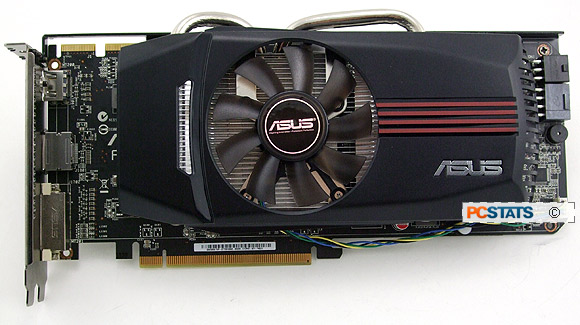
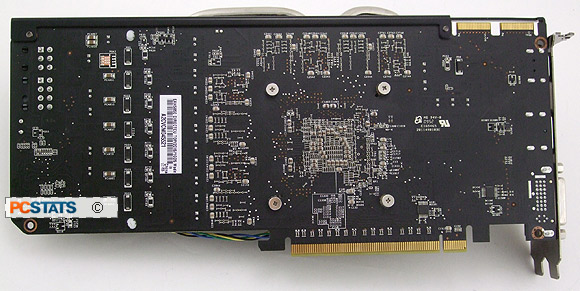
|
|
|
|
INCLUDES:
User's Manual, Driver CD, Utility CD,
molex-to-PCI Express converter, HDMI to DVI converter, DVI to
VGA converter, ATI CrossfireX bridge |
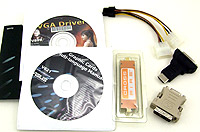 |
|
Graphics
Processor: ATI Radeon HD 5850 (765MHz)
Memory
Capacity: 1GB GDDR5 (4500 MHz)
Card
Format: PCI Express x16 2.0, two slots wide.
Outputs: DisplayPort, HDMI,
DVI-D
Videocard Class:
Enthusiast | |
| |
Like most Radeon 5000-series videocards, the ASUS EAH5850 DirectCU TOP
supports onboard hardware HD decoding technologies. ATI's AVIVO HD video
technology allows the GPU to process video streams using the Universal Video
Decoder. It also supports ATI Stream acceleration, with OpenCL and DirectCompute
support for applications like video encoding.
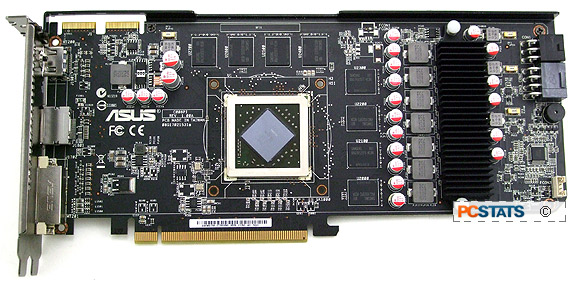
With
manufacturer selected GPUs and memory, ASUS has designed the EAH5850 DirectCU
TOP for serious overclocking. The included software CD comes with a copy of
ASUS' SmartDoctor overclocking suite, which allows for dynamic overclocking of
the GPU core and memory clock speeds, as well as the ability to over volt the
GPU's Vcore. We've come a long way from the days of having to flash a
videocard's BIOS in order to eke out a few more MHz from our GPUs. While ASUS
SmartDoctor software does the trick, the GUI very badly laid out, the slider
bars and numerical values too small, and too much space is devoted to flashy
graphics and bar charts that are completely unnecessary. ASUS really ought to
redesign the software package it bundles with overclocking videocards is devotes
so much time to building fast - this junky looking software tool is just a
travesty!
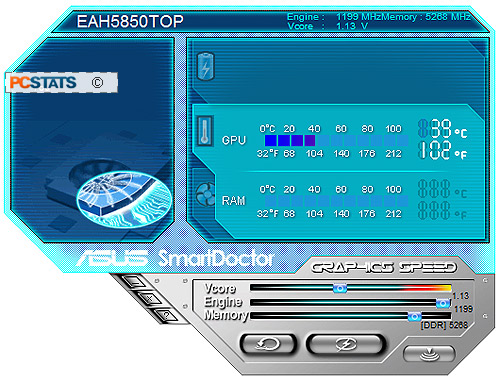
Video outputs on the ASUS EAH5850 DirectCU TOP include
the standard DVI, HDMI and a newer standard called DisplayPort. Display Port
will eventually replace DVI as the standard interface for computer monitors, but
right now most of you are likely to have DVI, and possibly HDMI only. Display
Port is designed for increased bandwidth rates that go up to 17.2Gb/s, and it
uses this extra data space to support multiple high resolution monitors - as in
ATI eyefinity. Display Port can also be daisy-chained, so a single display port
output can be connected to a Display Port compatible monitor, and that monitor
can then be connected directly to another monitor, and so on.
|
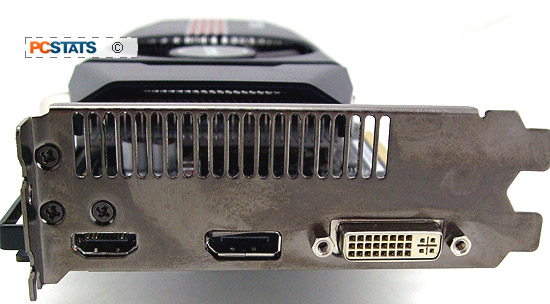
Video outputs: HDMI, display port
and DVI.
|
As this card stands, it will support up to three
monitors (with resolutions up to 2560x1600) at once using its Display Port
output. This videocard will also support newer 120Mhz monitors designed for 3D
stereoscopic gaming, as well as ATI's own Eyefinity gaming modes that allow
monitors to be 'tiled' together to form one massive display. Of course if you
don't have a DisplayPort-based monitor you can still use the ASUS EAH5850
DirectCU TOP, since it also has both DVI (max resolution 2560x1600) and HDMI
(1920x1200) video outputs. Naturally, the HDMI 1.3 output will also carry audio
if connected to a compatible display or receiver. ASUS also includes HDMI to DVI
adapter and DVI to VGA adapter, just in case you have an older secondary
display.
The ASUS EAH5850 DirectCU TOP uses a PCI Express 2.0 x16
connection to transfer data to and from the system. If you have a compatible
motherboard with dual PCI Express x16 or x8 slots, you can use the included
Crossfire bridge to hook up another Radeon HD 5850 videocard in CrossfireX mode.
|
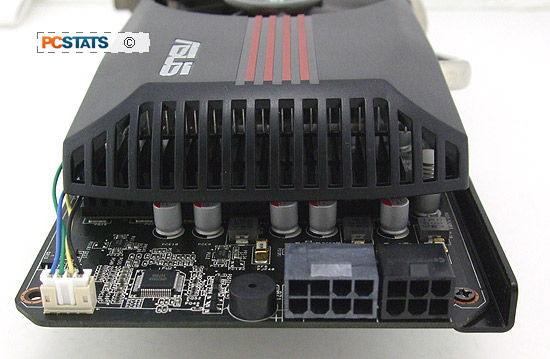
The ASUS EAH5850 videocard will
operate with two 6-pin PCI Express power connectors only, if you don't
have an 8-pin and 6-pin available.
|
On the rear end of the medium size, double slot wide
ASUS EAH5850 DirectCU TOP videocard you'll find an 8-pin PCI Express power
connector and a 6-pin PCI Express power connector. The videocard comes with an
molex-to-6-pin PCI Express power adapter too. PCSTATS was able to run and
overclock the EAH5850 DirectCU TOP without any difficulties using just a pair
of 6-pin PCI Express power connectors, although you may want to connect an 8-pin
PCI Express power connector for maximum overclocking results.
Exposed Heatpipe Thermal
Solution for a Videocard
|
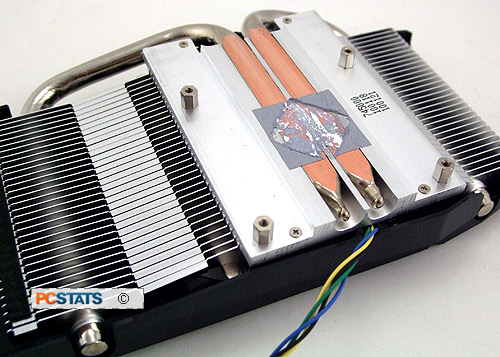
Exposed 8mm diameter heatpipes
contact the large silicon die of the Radeon HD 5850
GPU.
|
The design of the ASUS EAH5850 DirectCU TOP's
heatsink differs from the monolithic heat shroud design found on reference ATI
Radeon HD 5850 videocards. The shorter design doesn't quite exhaust hot air all
the way out of the computer chassis, but any problems this might cause are
easily remedied by having a secondary system fan to lower internal case
temperatures.
ASUS uses a thermal solution called DirectCU
to cool the overclocked Radeon HD 5850. DirectCU uses a pair of cooper cooling
pipes that make direct contact with the silicon of the GPU. This heat is
conducted along 8mm heatpipes to an array of aluminum fins that are in turn
cooled by the integrated fan.
Next up, the ATI Radeon RV870 Cypress GPU and
overclocking results!
|

